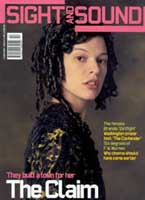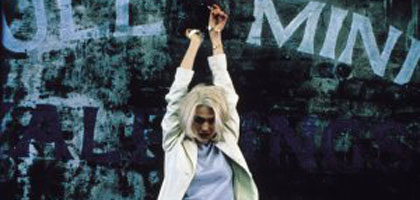
Beautiful Creatures
UK 2000

Reviewed by Claire Monk
Synopsis
Our synopses give away the plot in full, including surprise twists.
Glasgow, the present. After she is attacked by her heroin-addict boyfriend Tony (Iain Glen), Dorothy (Susan Lynch) decides to escape to London. She is about to get on the bus when her dog Pluto drags her away to help a young woman, Petula (Rachel Weisz), whose boyfriend, Brian (Tom Mannion), is trying to strangle her. Dorothy knocks Brian unconscious; the women take him back to Dorothy's flat where he later dies. At Dorothy's instigation, Petula tells her boss Ronnie (Maurice Roëves), Brian's brother, that Brian has gone missing. Petula is visited by a detective, Hepburn (Alex Norton). A ransom note arrives, accompanied by Brian's severed finger. On Hepburn's instructions, Petula rings the number on the note. Dorothy answers (on Brian's mobile) and tells Petula to name a ransom for Brian's return, which she does: £1 million.
Despite knowing otherwise, Hepburn assures Ronnie that Brian was alive when his finger was severed and claims the ransom demand is for £2 million. Tony returns home and forces Dorothy to inject herself with heroin. The pair fight Tony off and leave him tied up on the bed. Ronnie passes the £2 million to Hepburn, who passes only £1 million to Petula and then follows her. Petula is met by Pluto, wearing panniers to carry the money. Hepburn handcuffs Petula to a wall and pursues the dog to Dorothy's flat. Ronnie, who has been following Hepburn, turns up. Tony emerges and shoots Hepburn dead. Ronnie kills Tony and starts shooting at Dorothy, but Petula appears with a gun and kills him. The women leave in Hepburn's car. In the boot, they find the other £1 million and escape by train.
Review
Beautiful Creatures is the debut release from DNA Films - one of the three lottery-subsidised British mini-studios launched in 1997, headed by producers Duncan Kenworthy (Four Weddings and a Funeral) and Andrew Macdonald (Trainspotting). Given that Kenworthy and Macdonald have been two of the names most consistently associated with the major successes of the British film industry in the 90s, this first fruit of their collaboration cannot escape inflated expectations. Yet the dream team's past hits prompt the question of what their shared ideal for British cinema might be: it's hard to conceive of two more sharply opposed visions of late-90s Britain than Trainspotting and Notting Hill.
Beautiful Creatures is an enjoyable, stylish and fitfully inventive nasty-comic thriller with two great female leads and a charismatic canine co-star; but it also suffers from a lack of clear purpose. As with too many recent Brit-flicks, there's a suspicion that its makers were more excited by the idea's instant marketability than by the challenge of giving it enduring qualities as a film. The movie brims with pitchable concepts. Two attractive young women - Susan Lynch's feisty and resourceful Dorothy and Rachel Weisz' beautiful but dippy Petula - team up to escape male abuse, form a supportive friendship, and go on a revenge/crime spree with shades of Thelma & Louise. Aided by a pink dog! Prompting lashings of not-quite-comic violence! In great clothes! Featuring recreational drug use and porn! To a 60s girl-vocalist soundtrack! The result is relentlessly entertaining, but also quickly forgotten.
Kenworthy says that "the first star has to be the script" - but here, ironically, the script (by playwright Simon Donald) is the source of the film's lack of focus. As Donald's ill-received attempt to film his stage play The Life of Stuff showed, his highly verbal, vicious comedy can easily become incomprehensible on screen. Here, Donald's script has been developed in collaboration with the film's director Bill Eagles, but this seems only to have increased its convolution. The result is a triumph of quirky originality over clear motivation and certainty of tone, and neither Eagles (whose recent background is in mainstream ITV dramas such as Peak Practice) nor the talented cast seems able to elucidate the film's less helpful ambiguities. The character of Hepburn, the bent detective who hopes to profit from his investigation of businessman Brian's disappearance both financially and by abducting Petula, Brian's girlfriend, is particularly unconvincing. He is neither comic nor incompetent enough to neutralise the menace he presents to Petula; but nor does the film take this menace very seriously.
As this plot strand suggests - and oddly for a supposedly female-centred narrative - the film's uncertain tone extends to its attitude to its female protagonists. The alliance between Dorothy and Petula has its moments. Lynch is well used but Weisz's Petula is a more confused creation. Script and direction encourage us to empathise with her vulnerability, laugh at her dumb-blonde ineptitude and view her with the same salivating prurience as Hepburn. However, the film's contradictory gaze on Petula gains a certain logic in the light of another of its peculiarities, namely a fashionably casual preoccupation with pornography. Petula's forced employment by shady businessman Ronnie entails both secretarial work and participation in grainy, German-language video porn. At the film's denouement, porn is deployed as a source of supposedly humorous narrative tension. Handcuffed to a petrol-station wall by Hepburn while he pursues the canine courier Pluto, Petula has trouble persuading the counter attendant to release her because he is transfixed by the similarity between her pose and an image in the bondage magazine he's reading.
Beautiful Creatures' contradictions suggest an attempt to multiply its potential audiences - feminists, fashionistas, 18-to-24-year-old Loaded readers - but at the inevitable expense of coherence or substance. To this list of target markets should be added 20th-century design enthusiasts. Petula inhabits a fabulous modern-movement villa; Ronnie's wood-panelled office is the height of current retro fashion. Yet here too chic wins out over credibility: the credits boast of location shooting in Scotland, but the interiors seem straight out of Shoreditch. Trainspotting's Renton may have become a fashion icon but at least he didn't own a £3000-plus Charles Eames lounger, as tower-block heroin-users Tony and Dorothy seem to here.
Credits
- Director
- Bill Eagles
- Producers
-
Alan J. Wands
Simon Donald - Screenplay
- Simon Donald
- Director of Photography
- James Welland
- Editor
- Jon Gregory
- Production Designer
- Andy Harris
- Music
- Murray Gold
